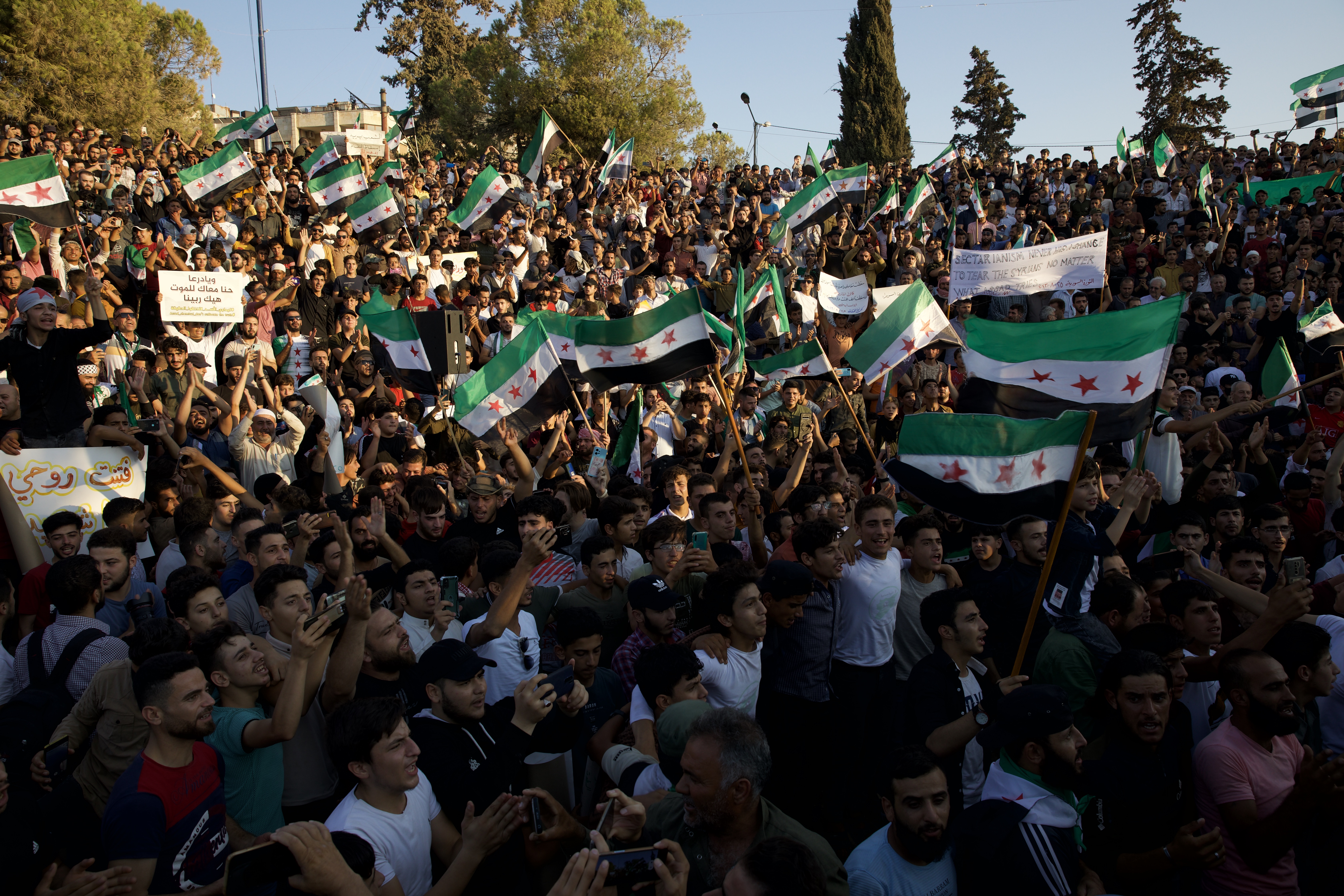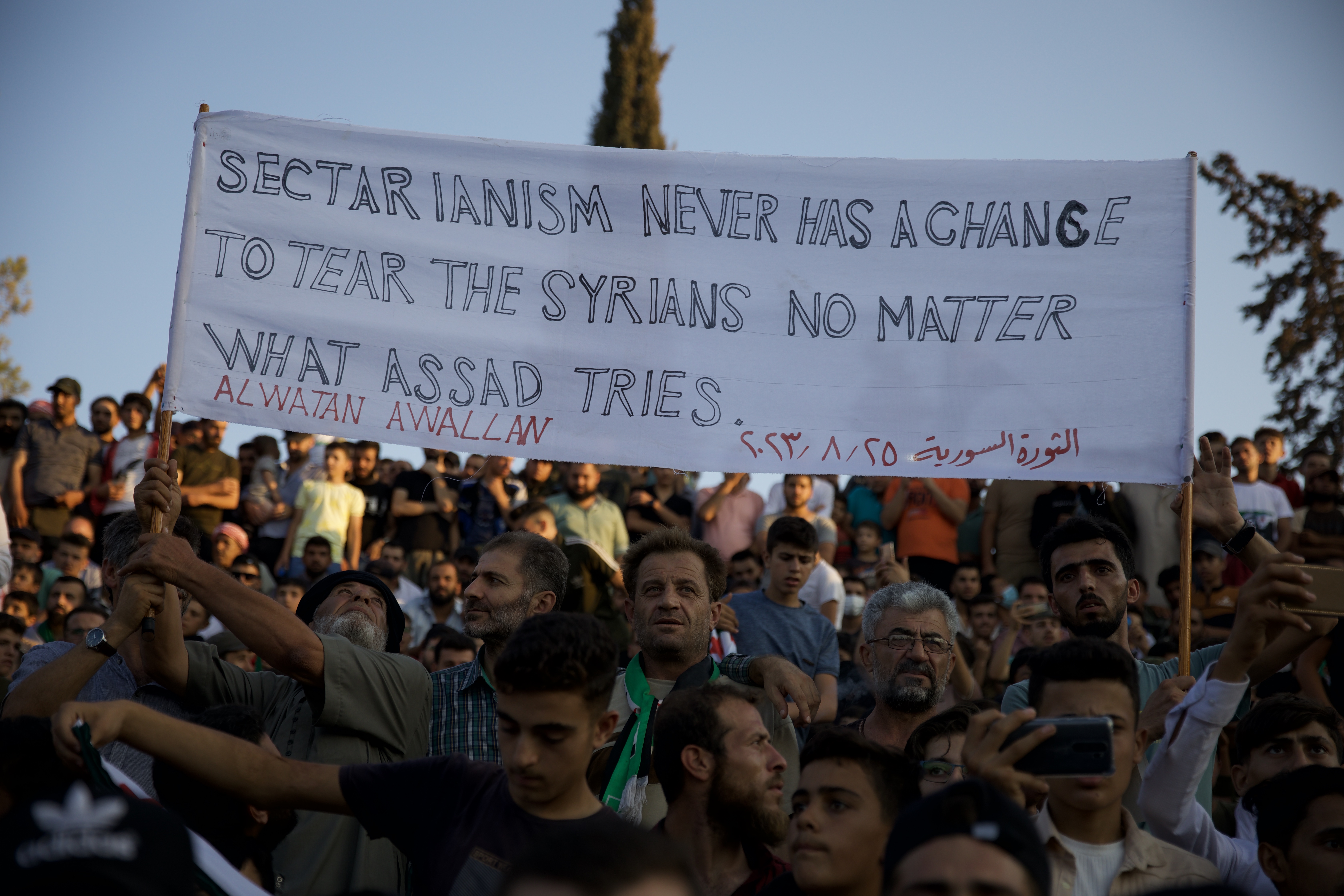
Anti-government demonstrations have taken place in several provinces in Syria, as protesters called for an overthrow of President Bashar al-Assad, in scenes reminiscent of the beginning of the Syrian uprising in 2011.
Hundreds of protesters gathered on Friday in Sweida and Deraa, both in southern Syria, northern Aleppo and Idlib, in the northwest, and Deir Az Zor, Raqqa and Hassakeh, in the northeast.
The protests began six days ago in government-controlled Sweida, as frustration at price rises led to the chanting of anti-government slogans.

“Our only demand is the overthrow of the regime as a whole because it is corrupt,” said Jamal, an activist from Sweida, expressing his hope that the demonstrations will continue, unlike in previous years, citing the support of the Druze clergy to those demands.
Members of the minority religious group, who make up the majority of Sweida’s residents, raised Druze flags alongside the flag of the Syrian opposition during the protests, activists said.
Support for Sweida
Protesters in other governorates raised slogans in support of the demands of the protesters in Sweida, and in an effort to portray a united opposition.
“There is no difference between Syrians of all sects, we took to the streets today to confirm that, and that the only criminal is Bashar al-Assad and everyone who helped him,” said Abu Salah Marea, an activist in the northern countryside of Aleppo.

In 2011, the Syrian government responded to peaceful protests with military repression, eventually turning the uprising into an armed conflict that continues to this day – although the government, with Russian and Iranian support, has now pushed the opposition back to the northwest of the country.
Opposition activists have estimated that more than 600,000 people have been killed in the war.
The war has also caused the displacement of more than half of the pre-war population inside and outside of the country, pushing many Syrians into poverty.
An activist from Deraa, who asked not to be identified for security reasons, told Al Jazeera that the mentality is now different to 2011.
“Now the people know that regime survival is a cause of greater chaos and deterioration than its departure,” the activist said.
Protester ‘courage’
The United States has backed the demonstrators.
“The Syrian people deserve our full support,” Linda Thomas-Greenfield, the ambassador to the UN, said earlier this week. “They deserve peace and security and justice.”
In turn, the German special envoy to Syria, Stephen Schneck, praised on social media the “courage” of the demonstrators and called on the regime to refrain from using violence to suppress them.
The director of the Studies Unit at the Abaad Studies & Research Center, Muhammad Salem, told Al Jazeera that he does not expect the government to resort to the severe security repression it used in 2011.
“The regime’s handling of demonstrations by Druze, Kurdish, or other minorities has always been different,” Salem said.
The Syrian government has previously made an effort to placate protester demands in Druze areas in the past, in an effort to prevent them from joining the opposition side.

Difficult challenges
Despite a reduction in front-line violence over the past few years, the Syrian government has been unable to rebuild the areas it has regained control over, and economic problems have increased.
The Syrian pound has lost more than 80 percent of its value in three months, and prices of essential goods are “spiralling out of control”, as Geir O Pedersen, special envoy of the Secretary-General for Syria, warned in a briefing to the UN Security Council.
Salem, of the Abaad Center, said that the Syrian government is resistant to any political reform, but he believed that it may make some concessions for various regions of the country, with the possible emergence of a certain independence from the central government in Damascus in those areas.
Radwan al-Atrash, the director of the Syrian Center for Community Development in Idlib, described the government’s promises of economic reform as “fake”.
But he still believed that demonstrations are capable of intimidating the government.
“The Syrian people, with their unity and revolution, are capable of overthrowing the regime and making Syria free for all,” al-Atrash said.







